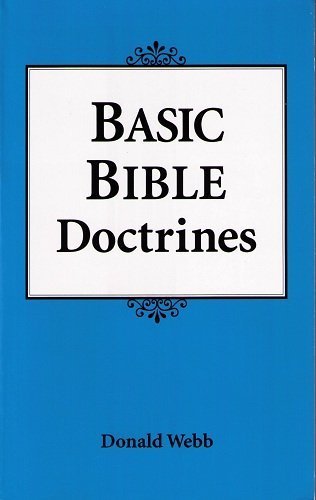Donald Webb, Basic Bible Doctrines (West Lafayette, IN: Day of Grace Ministries, Inc., 2006).
I’m always on the lookout for theologians who agree with Free Grace positions. To that end, I recently came across Donald Webb’s Basic Bible Doctrines. Webb is a Mid-Acts Dispensationalist. Some people in that camp hold to what are essentially Free Grace views. Here are some excerpts from chapters 5 and 6, on salvation and eternal security respectively.

Why “Salvation” Is Not a Technical Term
“The word salvation in the New Testament is from the Greek word soteria and literally means to deliver, to preserve, or to save. Salvation as used in the Bible applies to many different areas. It can mean salvation from an enemy, from problems, from error, and of course, salvation from sin” (p. 81).
Why Eternal Security Is the Same as Salvation
“Eternal security is really a continuance of the subject of salvation. When we say eternal security, we are really saying eternal salvation; and we are, of course, speaking of soul salvation” (p. 103).
“The simple truth is that to understand salvation is to understand eternal security” (p. 104).
“A salvation like this would not really be salvation at all because you do not have God’s salvation (eternal life) if it is not eternal—right? Therefore, we conclude that salvation cannot be received, maintained, or secured by our works” (p. 108).
That Repentance Is Not Necessary for Eternal Salvation:
“A person is not required to repent and show a changed life to be saved. He is not required to maintain some period of good works to be saved. Though both a changed life and good works would be the result of salvation, they are not required to be saved. There is no probationary period of any kind connected with salvation” (p. 106).
A Sinning Believer Can Lose Rewards but Not Salvation
“But what about when the believer sins? When a believer does sin, it is an issue between him and God his Father. It is family issue; it involves service not salvation. Salvation is complete and secure. From that time the Christian life is a matter of an eternal loving relationship with the Father (of growth and tender care of grace and, yes, even discipline) “until the redemption of the purchased possession…” Will we have to answer for sins committed as believers? Yes. Paul says in 2 Corinthians 5:10 that we must answer for the things done in the body whether they be good or bad. But this involves rewards and loss of rewards, not salvation” (p. 111).
The OT Saints and Faith Alone
“Even at that time salvation was not actually based upon works. Works were only to demonstrate faith, which has always been the means of salvation in God’s eyes. Failure to keep or to maintain any of the precepts of these covenants would not have cancelled anyone’s salvation. Failure to obey would have resulted in the prescribed physical punishment for that particular sin…Still other numerous verses under that same covenant had to do not with loss of salvation but with physical death for disobedience to the law” (pp. 114-115).
Disapproved but Not Sent to Hell
“The word castaway [1 Cor 9:27] is a real problem for many. Upon examining the Greek, we find that it means disapproved. Paul was referring to the judgment seat of Christ when, after a life of service, he might be disapproved as to rewards if he had not lived according to the truth. Salvation is not the issue at the judgment seat of Christ” (p. 120).
I have not finished reading through the book, but so far I have found it exceedingly clear and well-written. Unlike many self-published books, the typography is really excellent, and the quality of Webb’s writing is what you would expect from a professional publisher. He has clearly thought his positions through, and he writes for the serious believer without being obscure or pedantic. Even if the rest of the book turns out to be rubbish, the chapters on salvation and eternal security are worth the price of admission.
~Shawn Lazar

